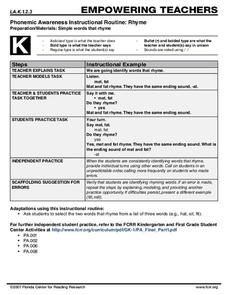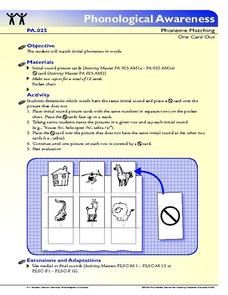Florida Center for Reading Research
Phonemic Awareness Instructional Routine: Rhyme
As a class, kindergarteners identify rhyming words. The teacher provides an example of a rhyming pair and explains why they rhyme. Individual learners then respond by saying a word that rhymes with a given word.
Florida Center for Reading Research
Word Checkers
Young scholars practice reading high-frequency words by playing word checkers. They use the provided checker mat and checkers to read their way to the other side of the mat, making a less stressful way to provide necessary practice.
Florida Center for Reading Research
Phoneme Feud
This is a phoneme feud! A literacy game that is very similar to the classic card game War! has partners challenging each other for the most phonemes. They place one picture card face-up at a time and segment the phonemes aloud. Whoever...
Florida Center for Reading Research
Phoneme Dominoes
Unlike regular dominoes, these have pictures of simple objects. Images are matched (like pig and plant) based on their initial phonemic sound. Learners will have fun playing and saying various words, matching initial letter sounds as...
Florida Center for Reading Research
Picture Slide
Here is another fun and engaging way to help youngsters build phonological awareness. In pairs, they use the provided picture cards to sound out segments of words. As they slide the picture together they say a segment of the...
Florida Center for Reading Research
Word Blender
Little learners will love being able to blend sounds together to make words. This game provides eight onsets and eight rimes that can be used to mix and match to sound out words. This activity is to be completed in pairs and is a great...
Florida Center for Reading Research
One Card Out
Remember the song, "One of These Things is not Like The Other?" Well, this phonemic awareness activity is just like that. The only difference is that learners work to determine which initial phoneme is not like the others on the chart....
Florida Center for Reading Research
Final Phoneme Pyramid
Little learners identify final phonemes found in various words. They play a game where they pick a card, say the name of the object on the card, identify the final phoneme, then match it to an image with the same final phoneme. Whoever...
Meadows Center for Preventing Educational Risk, University of Texas at Austin
Lesson 15 - Soft G and Soft C
The names Cindy and Carrie start with the same letter, but have very different sounds. The 15th of 17 word recognition lessons focuses on the soft C sound found in Cindy and the soft G sound found in Gene. Direct instruction starts with...
Meadows Center for Preventing Educational Risk, University of Texas at Austin
Lesson 8 - Open Syllables
Just like scholars plug something in to close a circuit, they must plug a consonant onto a word to make closed syllables. Help learners distinguish between open and closed syllables with a series of activities that emphasize open...
Meadows Center for Preventing Educational Risk, University of Texas at Austin
Lesson 6 - Vowel-Consonant-E Syllables
Adding an e sometimes significantly changes the pronunciation of a word. An informative lesson plan introduces Vowel-Consonant-E syllables by helping learners see the difference between the pronunciation of words like mop and mope. A...
Meadows Center for Preventing Educational Risk, University of Texas at Austin
Lesson 1 - Short Vowels
Apple, Adam, and At all have something in common. What is it? They all start with the short A sound. The first lesson plan of set in the Word Recognition and Fluency series introduces readers to short vowel sounds with a series of...
Meadows Center for Preventing Educational Risk, University of Texas at Austin
Lesson 17 - Adding Suffixes That Change Base Words' Finally to I
If it ends in a y, change the y to i when adding a suffix like -ness, -ly, or fy. The final lesson in the Word Recognition and Fluency series of 17 explains when to change the final letter in a base word to i before adding a suffix....
Meadows Center for Preventing Educational Risk, University of Texas at Austin
Lesson 13 - Multisyllabic Word Reading
One- and two-syllable words may flow from the tongue with ease, but longer words, such as department and volcano, feel like tongue twisters. Scaffolded instruction explains how to break words into their individual syllables, and then...
Meadows Center for Preventing Educational Risk, University of Texas at Austin
Lesson 10 - Compound Words
Individually, words have power, but when added together, they can take on a whole other level of meaning. Readers learn about compound words in the 10th of 17 lessons of the Word Recognition and Fluency series. A script provides guidance...
Meadows Center for Preventing Educational Risk, University of Texas at Austin
Lesson 9 - Contractions
Is it do'nt or don't? How about doesn't or does'nt? A lesson on contractions helps learners identify, form, and use contractions. Components within the plan include direct instruction on decoding and encoding contractions, as well as...
Meadows Center for Preventing Educational Risk, University of Texas at Austin
Lesson 7 - Letter Combinations
Individually, letters have their own sounds, but when combined with other letters, those sounds completely change. Introduce letter combinations with a lesson that asks learners to search for combinations in familiar words and use oral...
Meadows Center for Preventing Educational Risk, University of Texas at Austin
Lesson 4 - Consonant Blends
Old, ild, ind, and ost may sound like a foreign language, but they actually represent common final consonant blends. Help learners recognize and pronounce consonant blends with step-by-step instructions, including scripted conversations....
Meadows Center for Preventing Educational Risk, University of Texas at Austin
Lesson 3 - Consonant Digraphs
Words such as witch, whack, and wish often cause beginning readers to struggle. The third installments in the Word Recognition and Fluency series of 17, covers consonant digraphs. Activities guide learners through the identification and...
Meadows Center for Preventing Educational Risk, University of Texas at Austin
Lesson 2 - Consonant-Vowel-Consonant Words
Closed syllable words contain short vowel sounds. A phonics lessons introduces readers to consonant-vowel-consonant words. Guided instruction introduces the words with a series of dictation activities, and then learners practice reading...
Rosetta Stone
Sight Word Flashcards
While kindergarten readers are working on the, my, and is, older elementary learners are mastering although, usually, and beautiful. Help readers of all ages work on sight words that do not follow phonics rules, but are key to reading...
Nosapo
Word Family
What do a man, a can, and a fan have in common? They are all in the same word family! Young readers practice adding the first letter or letters to each word within a particular word family.
Florida Center for Reading Research
Phonological Awareness
Kindergarteners and first graders alike are engaged as they learn the initial sounds of objects by taking turns flipping cards to form a long train. This complete and ready-to-print activity helps young ones build the basic foundations...
SEN Teacher
Literacy Dice
Reinforce literacy skills using a six-sided die that focuses on phonics and story starters. Scholars roll, and show what they know about blends, plots, and more!

























